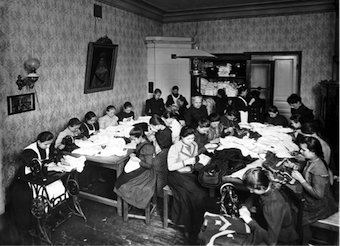

|
The Patriotic Revolution  Women volunteers making uniforms The reverses at the Front were blamed by the public on the government and its army command. The Zemstvo Union and Union of Towns (known together as Zemgor) sprang into action, virtually running the military supply campaign in the absence of an effective government system. Led by Prince Georgii Lvov, a liberal nobleman and Zemstvo activist since the famine crisis of 1891, Zemgor quickly grew into a huge national infrastructure, an unofficial government. The civic spirit of the February Revolution had its roots in the wartime activities of Zemgor and other voluntary organizations. One of these was the War Industries Committee, established by liberal businessmen in 1915 to break down the monopoly of the big munitions producers and win more influence for themselves and their allies in the Duma in the wartime regulation of industry. All but three of the ministers of the First Provisional Government of 1917 (led by Prince Lvov) had emerged as national leaders through Zemgor or the War Industries Committee. Under growing pressure, the Tsar finally agreed to recall the Duma on 19 July 1915. The liberal opposition now had a platform on which to renew its demands for a ministry of national confidence. Two-thirds of the Duma deputies formed themselves into a Progressive Bloc to consolidate this campaign. They urged the Tsar to appoint a new government capable of winning the Duma's support. The more radical deputies called for a parliamentary government responsible to the Duma. Within the Council of Ministers there was a growing majority in favour of a compromise with the Progressive Bloc. They were alarmed that, with the Tsar's departure for the Front, the government was left at the mercy of the Empress and Rasputin. But Alexandra persuaded Nicholas to reassert his autocratic power. On 2 September the Duma was closed down - a move that sparked a two-day general strike in Petrograd but no further action by the liberals who were frightened of a revolution on the streets. |
© 2014 Orlando Figes | All Rights Reserved